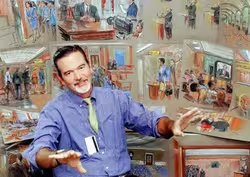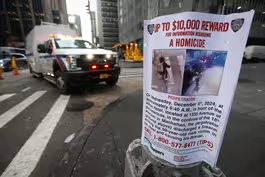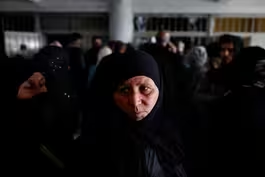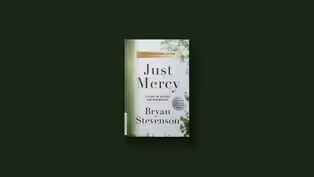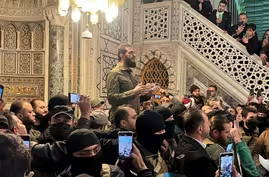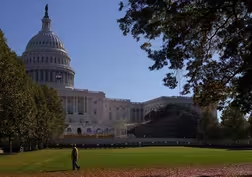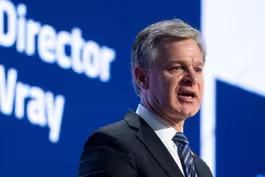
Can the nation unite after the election? Analysts weigh in
Clip: 12/11/2024 | 10m 59sVideo has Closed Captions
Can the nation unite after the divisive election? Political analysts share insights
For the past two years, Judy Woodruff has been exploring the deep divisions we see playing out every day in the country. As we wrap up the year, she recently sat down with a panel of noted thinkers to talk through their concerns, and their hopes, following the election. It’s part of her series, America at a Crossroads.
Problems playing video? | Closed Captioning Feedback
Problems playing video? | Closed Captioning Feedback
Major corporate funding for the PBS News Hour is provided by BDO, BNSF, Consumer Cellular, American Cruise Lines, and Raymond James. Funding for the PBS NewsHour Weekend is provided by...

Can the nation unite after the election? Analysts weigh in
Clip: 12/11/2024 | 10m 59sVideo has Closed Captions
For the past two years, Judy Woodruff has been exploring the deep divisions we see playing out every day in the country. As we wrap up the year, she recently sat down with a panel of noted thinkers to talk through their concerns, and their hopes, following the election. It’s part of her series, America at a Crossroads.
Problems playing video? | Closed Captioning Feedback
How to Watch PBS News Hour
PBS News Hour is available to stream on pbs.org and the free PBS App, available on iPhone, Apple TV, Android TV, Android smartphones, Amazon Fire TV, Amazon Fire Tablet, Roku, Samsung Smart TV, and Vizio.
Providing Support for PBS.org
Learn Moreabout PBS online sponsorshipAMNA NAWAZ: For the past two years, Judy Woodruff has been exploring the deep divisions we see playing out every day in the country.
As we wrap up the year, she recently sat down with a panel of noted thinkers to talk through their concerns and their hopes following the election.
It's part of her ongoing series, America at a Crossroads.
JUDY WOODRUFF: We met last week at the Lincoln Cottage in Washington, D.C., a place we have returned to throughout our series, here in the room where the 16th president drafted the Emancipation Proclamation.
Joining me were former federal appellate Judge Michael Luttig, one of the nation's leading conservative jurists, Heather Cox Richardson, historian at Boston College and author on Substack of the daily Letters from an American, and Theodore Johnson, contributing columnist for The Washington Post and retired Naval officer.
I began by asking them what they thought the American people were saying in this most recent election.
J. MICHAEL LUTTIG, Former Fourth Circuit Court of Appeals Judge: America has come to the crossroads now.
This was the most transparent president and presidency in American history.
Americans literally knew everything there was to know about Donald Trump.
And he succeeded in convincing millions upon millions of Americans that this was just another presidential election where both candidates should be considered equally, as if the one had never been president before.
HEATHER COX RICHARDSON, Boston College: I think most Americans simply were saying they didn't like the higher prices that came after the coronavirus pandemic.
And what they're going to get is something very different than they thought they wanted.
So, for example, we know that people who say they paid no attention at all to political news went 19 points for Donald Trump.
People we know who were informed of what was really happening with crime and with the economy and with immigration went 2-1 for Vice President Kamala Harris.
Those people who were misinformed about those things went 3-1 for Donald Trump.
So we have -- are facing, I think, the crisis that the judge identifies of American democracy, but we're doing so in the midst of a different kind of crisis, which is a disinformation crisis.
JUDY WOODRUFF: And, Ted Johnson, you wrote right after the election that you thought democracy had held.
CMDR.
THEODORE JOHNSON (RET.
), Contributing Columnist, The Washington Post: Yes, I think it held because we had a free and fair election and the popular vote winner is also going to win the Electoral College and the system operated in exactly the way it was set to operate.
The one flaw in the system, at least from the founders' perspective, is the founders always suspected that the Electoral College and other representatives would ensure that people of ill character never got this far, to ensure the voice of the people were filtered through folks that put justice first, who were patriots who put the country above their own partisan or selfish concerns.
And that just has never panned out in American history and certainly hasn't recently.
I'd also say that Americans told us that they're willing to be a little transactional with their vote for president, instead of suggesting that the person they vote for is their -- a civic exemplar or a hero of sorts, instead saying maybe this person's character is a little flawed or faulty.
JUDY WOODRUFF: Do you believe we still have a strong democracy in this country?
J. MICHAEL LUTTIG: We only know that our democracy held because Donald Trump won the vote.
Going into the election, he was unapologetic about the fact that, if he did lose the vote, that he would challenge that vote in the same way that he had done in 2020.
Donald Trump and the Republican Party essentially held America political hostage by threatening to overturn this election if Donald Trump lost.
That's not a free and fair election.
HEATHER COX RICHARDSON: Our democracy is reeling, but it has not yet disintegrated.
I'm very concerned about the incoming Trump administration and the attempts to install what people are calling henchmen now, instead of simply loyalists, in crucial positions.
But I'm not ready yet to concede that it's gone, because the other side of that, of course, is the organization that you see going on among people who are now recognizing that our country, our way of life and our dreams are on the line right now in a way that they haven't been really since perhaps the 1890s or the 1850s, and seemingly being willing to take up the torch to carry that forward.
In the past, we have managed to do it.
I'm a little concerned about whether we will do it now.
JUDY WOODRUFF: What we have been dealing with is a very divided country for the last several years, Ted Johnson.
Has this election made that worse?
CMDR.
THEODORE JOHNSON (RET.
): I don't think it's made it worse, but it certainly hasn't improved it.
And we will see if there's a sort of an evolution or a devolution of our democracy.
Our constitutional democracy was OK with slavery at the founding of the country.
Our constitutional democracy was OK with disenfranchising women until just 100 years ago.
Our democracy was OK with keeping immigrants from Asia, from Central and South America, from parts of Europe like Ireland and other places, folks that didn't have property out of democracy.
Nothing has happened in the last month to our democracy that is worse than what has happened to our democracy in the past.
And if this is the moment that breaks the democracy, then we're just not the people that have earned the right to keep it.
My sense of it is, we are just as good as the generations that have come before us and now it's our turn to protect and defend democracy, which always is in need of protection and defense.
J. MICHAEL LUTTIG: We will be more divided than even we have been in the past four years, and you can rest assured that the president and the Republican Party will take that win as validation and vindication of the policies, if you will, of division and divisiveness that they have thrust upon the American people.
HEATHER COX RICHARDSON: The division of the American people was a very deliberate political project from the 1950s onward, and it has paid enormous dividends for certain politicians.
But the reality is, the majority of Americans have always liked the liberal consensus of the post-World War II years and they still do.
If you look at the downballot races in 2024, people voted to protect abortion rights.
They voted for the protection of minimum wages.
They voted for a lot of things that in fact the Democrats were the ones embracing.
In fact whether you're a Republican or a Democrat most people believe in a government that does the basic things of regulation of business, protection of a basic social safety net, infrastructure and the protection of civil rights, and that those people in the middle should hang together against the extremists on the outside.
JUDY WOODRUFF: So are you saying that we -- that the politicians have been trying to divide the American people... HEATHER COX RICHARDSON: I am.
JUDY WOODRUFF: ... and the American people are resisting them?
HEATHER COX RICHARDSON: And Ted Johnson agrees.
(LAUGHTER) CMDR.
THEODORE JOHNSON (RET.
): Yes, that's right.
No, I was recently in North Carolina, and a high school friend told me that they didn't like either of the parties, either of the candidates, because both of them make the other out to be worse than they are and make problems out to be worse than they are.
And so neither could be trusted to either speak honestly about what the problems were and what were causing it or what the fixes were and who could accomplish it.
JUDY WOODRUFF: Where do you see us headed?
HEATHER COX RICHARDSON: There are two things I think we have to do going forward at the very basic level.
We need to protect American institutions.
But in this moment, we need to look at the right and recognize that they are serving up to their voters a fiction that shapes those people's lives and their voting behavior.
And to the degree that we all can insist on actual fact-based reality informing our policies will go a long way to healing those divisions and to recognizing that in fact most of us do agree that we're somewhere in the middle on these big questions and that solving them is actually not that difficult once you can agree on the problem.
CMDR.
THEODORE JOHNSON (RET.
): I feel pretty good about democracy.
And when I say that, I mean in terms of people having a democracy that's accessible.
A republic, however, is in tatters.
And so the Electoral College needs reform or replacement or abolishing, something.
Gerrymandering needs to be out the window, dark money in politics out the window.
And then the last thing I would say is, Americans need to turn away from D.C. and towards their communities.
Whatever the future of this country looks like, I promise you the answer is in local America and not in the nation's capital.
Turn away from that stuff and turn towards, like, the soccer teams or the neighborhoods or the churches, the school systems, et cetera, and learn how to work together in your communities.
And that will model the kind of democratic republic for the nation.
J. MICHAEL LUTTIG: The former president bent the institutions of democracy and law arguably to the breaking point.
And those institutions yielded to his will.
That was in the past four to eight years.
But he campaigned on revenge, revenge against his political opponents and an avengement of these very institutions of democracy and law, who he told the American people had failed him and them.
In my view, they elected him because they wanted done what he said he would do.
And now he is going to do that.
And there is nothing that can stop him.
HEATHER COX RICHARDSON: I'm a historian.
I always make the point that the future is not written.
We don't know what's going to happen.
And with as many people still having a voice in our way of life, if not necessarily in our voting world, because, in fact, free and fair maybe, because, of course, there is voter suppression in a lot of places.
So this really is a test of who we are, not just who our very worst leaders are, but who we are.
And do I believe we can do it?
I believe that we have to believe we can do it, or we have guaranteed that we cannot.
JUDY WOODRUFF: Well, on that note, thank you.
Longtime court sketch artist Bill Hennessy Jr. dies
Video has Closed Captions
Clip: 12/12/2024 | 1m 28s | Longtime court sketch artist Bill Hennessy Jr. dies (1m 28s)
Evidence at CEO murder scene linked to suspect, police say
Video has Closed Captions
Clip: 12/11/2024 | 4m 25s | Evidence at UnitedHealthcare CEO murder scene is linked to suspect in custody, police say (4m 25s)
Fall of Assad sparks hope but some Syrians remain concerned
Video has Closed Captions
Clip: 12/11/2024 | 5m 14s | Fall of Assad sparks new hope in Syria but minority groups remain concerned (5m 14s)
Stevenson reflects on inequities 10 years after 'Just Mercy'
Video has Closed Captions
Clip: 12/11/2024 | 7m 36s | Stevenson reflects on inequities in justice system 10 years after release of 'Just Mercy' (7m 36s)
Syrian leaders promise unity while holding Assad accountable
Video has Closed Captions
Clip: 12/11/2024 | 3m 25s | Syria's new leaders promise unity while also holding Assad facilitators accountable (3m 25s)
Trump nominees visit Capitol Hill to build support
Video has Closed Captions
Clip: 12/11/2024 | 5m 40s | Several Trump nominees visit Capitol Hill to build support for their confirmations (5m 40s)
Wray resignation paves way for Trump's new pick to lead FBI
Video has Closed Captions
Clip: 12/11/2024 | 5m 28s | Wray's resignation paves way for Trump's new choice to take charge of FBI (5m 28s)
Providing Support for PBS.org
Learn Moreabout PBS online sponsorship
- News and Public Affairs

FRONTLINE is investigative journalism that questions, explains and changes our world.

- News and Public Affairs

Amanpour and Company features conversations with leaders and decision makers.












Support for PBS provided by:
Major corporate funding for the PBS News Hour is provided by BDO, BNSF, Consumer Cellular, American Cruise Lines, and Raymond James. Funding for the PBS NewsHour Weekend is provided by...
